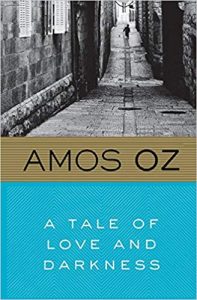A Tale of Love and Darkness
A Tale of Love and Darkness, by Amos Oz; Review by Frank Thomas Smith
This is a memoir, an autobiography written by a novelist who admits his disdain for footnotes, so they are few and far between. This, however, is not the book’s only virtue. Love and darkness as the two powerful forces running through his extraordinary, moving story which begins in Poland and Russia where his ancestors lived and died before and during the holocaust. But his parents and other relatives and friends were zealous Zionists and escaped to Palestine while there was still time. Amos Oz was born in Jerusalem in 1939 and lived through and participated in the history of Israel from its (modern) beginning to date. The characters here are not the historian’s bloodless footnotes, but real people, most of whom we wish we knew.
Rather than run on about the book’s contents and virtues, I prefer to lift an excerpt which particularly interested me – although there are many others. This book is required reading for anyone who loves literature and is interested in the Palestinian-Israeli conflict.
Frank Thomas Smith
“After my military service, in 1961, the Committee of Kibbutz Hulda sent me to Jerusalem to study for two years at the Hebrew University. I studied literature because the kibbutz needed a literature teacher urgently, and I, studied philosophy because I insisted on it. Every Sunday, from four to six p.m., a hundred students gathered in the large hall in the ‘Meiser’ Building to hear Professor Samuel Hugo Bergman lecture on ‘Dialogical philosophy from Kierkegaard to Martin Buber’. My mother, Fania, also studied philosophy with Professor Bergman in the nineteen thirties, when the University was still on Mount Scopus, before she married my father, and she had fond memories of him. By 1961 Bergman was already retired, he was an emeritus professor, but we were fascinated by his lucid, fierce wisdom. I was thrilled to think that the man standing in front of us had been at school with Kafka in Prague, and, as he once told us, had actually shared a bench with him for two years, until Max Brod turned up and took his place next to Kafka.
“That winter Bergman invited five or six of his favourite or most interesting pupils to come to his house for a couple of hours after the lectures. Every Sunday, at eight o’clock, I took the number 5 bus from the new campus on Givat Ram to Professor Bergman’s modest flat in Rehavia. A pleasant faint smell of old books, fresh bread and geraniums always filled the room. We sat down on the sofa or on the floor at the feet our great master, the childhood friend of Kafka and Martin Buber and She author of the books from which we learnt the history of epistemology and the principles of logic. We waited in silence for him to pronounce. “Samuel Hugo Bergman was a stout man even in old age. With his shock of white hair, the ironic, amused lines round his eyes, a piercing glance that looked skeptical yet as innocent as that of a curious child, Bergman bore a striking resemblance to pictures of Albert Einstein as an old man. With his Central European accent, he walked in the Hebrew language not with a natural stride, as though he were at home in it, but with a sort of elation, like a suitor happy that his beloved has finally accepted him and determined to rise above himself and prove to her that she has not made a mistake. More »
